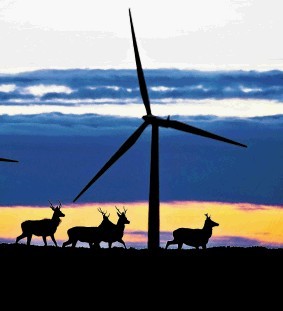
Some say Scotland must make a choice for our future: pursue economic growth, or protect the environment. My response is simple – there is no contradiction in pursuing both. The only credible long-term economic strategy is to exploit Scotland’s unique advantages – engineering excellence, research base, energy expertise and natural resources – to grow the economy, while reducing emissions long-term.
It is well known that the Scottish Government wants to maximise resource recovery in the North Sea, yet develop a low carbon economy. These goals are complementary: a successful oil and gas sector is essential if Scotland is to diversify its energy supply and service a growing market for low carbon goods and services.
The global economy is in the early stages of a transition away from fossil fuels. Scotland is recognised the world over for forcing the pace of this transition – not least through the world’s most stretching domestic emissions-reduction targets. But we recognise that this is a story that will unfold in stages. It is essential we extract maximum value for Scotland at each stage.
Even on the most optimistic projections for the growth of renewable energy, oil and gas remains the dominant fuel source for decades to come. It underpins services essential to our lives: transport, heating, agricultural fuels, chemicals, and plastics.
Our future is one fuelled by clean electricity, generated by Scotland’s vast renewable reserves, but we are not yet ready to make the final leap away from hydrocarbons. Until technology matures, there will remain a global demand for oil and gas. It is essential, therefore, that Scotland supplies it and can benefit from it; it is folly to do otherwise.
Our oil and gas strategy – developed in conjunction with industry – is to maximise recovery of Scotland’s remaining oil and gas reserves. I believe the most pressing challenge is to improve recovery rates.
Norway enjoys average extraction rates of 48% from North Sea wells; Scotland only 40%. This is monumental waste. It robs future generations of the benefit of revenues from a precious, finite resource.
We are now in a race to ensure we can maximise the benefit to Scotland while essential North Sea infrastructure remains: each percentage point increase in recoverable reserves from the North Sea will result in a rise in Scottish economic output of £89billion and result in £22billion of tax revenue. These are the revenues that will support our investment in Scotland’s low carbon revolution.
Even with improved recovery rates, oil and gas reserves cannot last forever – but the legacy of the industry can. We are laying the foundations for the long-term transition to an enduring low carbon industry. The economic value of the oil and gas sector to Scotland is enormous: the largest single industrial sector by value, the largest capital investor, the largest employer. 200,000 people are employed in oil and gas and its related industries in Scotland alone.
The value in protecting this asset is clear: Scotland’s place in the global market for low carbon goods and services will rely on the same talented workforce, the same supply chain, the same ingenuity and the same unrivalled knowledge of our lands and surrounding waters. There should be no doubt, the prize for this successful transition is enormous: already global low carbon sales are worth £3trillion globally.
All this requires an enlightened perspective and the careful management of resources. Alas, the prevailing Westminster view of Scottish resources is too short-sighted. It sees only the value of the remaining hydrocarbons.
This outlook has led the UK Government to mismanage an unstable tax regime in the North Sea, damaging vital investment at a crucial stage in the development of the offshore industry. And this outlook has left potential investors in renewable energy uncertain on the future of regulated returns from their investment.
In an independent Scotland, stability will underpin the taxation and regulation of oil and gas production and the energy market. The Scottish Government will honour all licences granted by the UK Government for Scottish geographical waters and ensure a statutory procedure for mandatory consultation with the industry before changes to the North Sea fiscal regime.
More prudent stewardship of Scotland’s resources would recognise the broader set of Scottish assets – the same assets that will support a low carbon future beyond oil and gas:
The concentration of energy-related industries that have made Aberdeen second only to Houston as a global centre of expertise in upstream oil and gas services and technologies; the world-leading skills and talent of our offshore industry which will support the installation of an offshore renewables grid; the offshore infrastructure that can return CO2 to be stored in our vast undersea reservoirs; and Scotland’s unrivalled research and innovation in subsurface activity – the same ingenuity that may ultimately help drought-stricken areas of the world access water.
For these ambitions to be realised, we must support the growth of activity in the north-east now. High oil prices mean we are currently enjoying record levels of investment in our offshore industry, but this is constrained by the availability of skilled labour. The Scottish Government is supporting the creation of a Skills Academy to improve the supply of skilled workers to the sector. The skills academy will also be the hub for the transition of skills to low carbon industries.
We stand confidently at the beginning of a low carbon revolution – one in which Scotland will continue to enjoy an embarrassment of energy riches. The oil and gas sector will continue to thrive for many years to come – supporting a global demand for energy. But this is the best possible foundation for the managed transition to our low carbon future and a vast new market for Scottish goods and services.
Fergus Ewing MSP is minister of energy, enterprise and tourism in Scotland
Recommended for you
